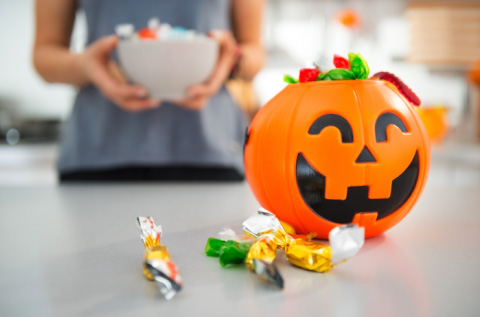
To most people halloween is a time of ghosts, witches and ghouls, but this year the UK’s leading dental health charity reminds parents how traditions such as trick or treating can increase risks of damage to their children’s teeth.
After an evening of trick or treating, children are likely to return home with a goody bag full of sweets and sugary foods. Although this is exciting for children, parents need to be aware of the risk of tooth decay. The British Dental Health Foundation’s Chief Executive, Dr Nigel Carter, explains that it is better for children to eat sugary foods all together, rather than to spread eating them out over a few hours.
Dr Carter said: “We want children to enjoy themselves at Halloween. The trick is to find a middle ground – not to gorge on sweets for hours.” With Bonfire night also only around the corner, and all the food delights that come with it, the Foundation emphasises that everything is OK in moderation.
Dr Carter added: “It’s OK to have the odd sugary treat on a special occasion as long as children keep up their regular dental health routine. On a daily basis, it is important that children have a healthy balanced diet, with five portions of fruit and vegetables.
In addition to Foundation’s three key rules for good oral health1, these following tips are recommended this Halloween:
“This combined with a good dental cleaning routine with fluoride toothpaste will help protect the teeth against conditions such as tooth decay and gum disease.
“Each time a sugary food or drink is consumed the sugar reacts with the bacteria in plaque (the sticky coating on the teeth) and produces harmful acids. These acids attack the teeth and dissolve the protective enamel coating on the teeth, which after many such attacks can lead to a cavity (a hole) forming in the tooth and eventually a need for a filling or extraction – something every parent would want their child to avoid.
“The key thing for parents to remember is that it is how often sugar is consumed, rather than how much sugar, which affects the chance of decay.
“It takes the saliva in the mouth up to an hour to neutralise the acid. This means every time sugary foods or drinks are consumed, the teeth are under attack for an hour.
“If children are constantly snacking on sweet foods, their teeth never have a chance to recover completely.”
For this reason, the Foundation advises parents to limit their children’s sugar intake to three meals and two snacks a day. When possible sweet treats should be eaten at mealtimes, during meals extra saliva is produced and this can help rinse away extra sugars and bacteria. Substituting sweets for crisps or other carbohydrate snacks won’t stop the risk of cavities either.
These can also create an acid environment in the mouth and lead to cavities. Instead, parents can give out healthy snacks such as fruit or breadsticks or even small toys to “Trick or Treaters”.
The Foundation suggests offering sugar-free sweets and avoiding giving out sticky, sweets such as toffee that stick to the teeth and give the bacteria a longer time in which to attack.